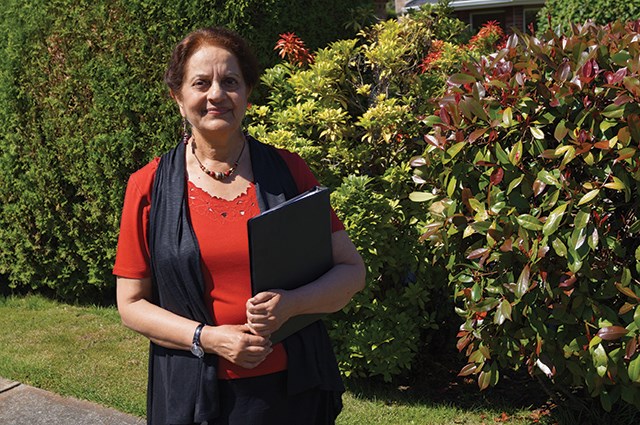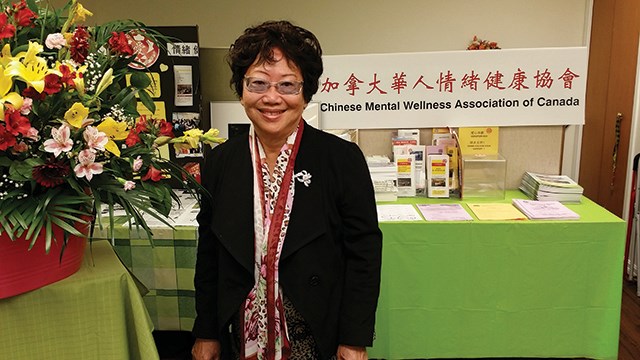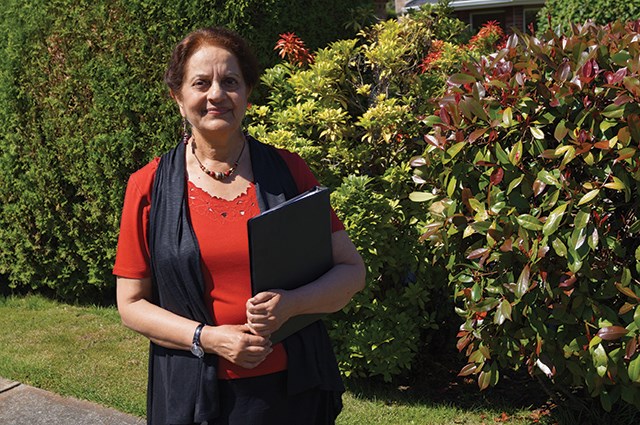“It’s the choice between the devil and the deep sea.”
This is how Shashi Assanand, executive director at Vancouver and Lower Mainland Multicultural Family Support Services, simplifies the conundrum faced by domestically abused women who have recently immigrated to Canada.
Domestic violence comes in many forms, including financial, sexual, physical, emotional, and spiritual abuse. It crosses all cultures and societies and is by and large typified by male-on-female abuse; national statistics from 2011 show that of Canada’s 89 police-reported spousal homicides that year, 85 per cent of the victims were women; on average, every six days in our nation, a woman is killed by her spouse.
This fact hit home here in Richmond recently when Jian Hua ‘James’ Wu is alleged to have killed his wife in their apartment on Granville Avenue. To be clear, Wu has not been tried in court, but incident came amidst a flurry of violent domestic abuse incidents across the province that sparked protests from women's rights groups.
Dealing with these problems takes a collective effort by government and non-profit agencies. In recent years the federal government says it has increased funding for settlement programs, which aim to help integrate immigrants into the fabric Canadian society. But the jury is still out on whether or not the government’s approach, as well as its immigration laws, is working.
While Statistics Canada does not track abuse cases along ethnic lines, Assanand is backed by an abundant amount of research that suggests immigrant women — once they move to Canada — are not only more vulnerable to becoming victims of domestic abuse, they have historically not received culturally-appropriate services to allow them to swim free of their abusers.
“When domestic abuse is mentioned (in the media), culture becomes the factor rather than domestic violence. Domestic violence is about power and control and power and control is the same across all cultures, except, the way an Indian or Chinese or Vietnamese woman responds to support is very different, because that’s based on her culture and values,” explained Assanand.
About 65 per cent of Richmond’s population speaks an Asian language at home and much of Assanand’s work in Richmond focuses on working with women from these collective cultures, where there is a greater emphasis on interdependence within families.
“If a collective culture works there’s nothing like it. There’s so much support, no babysitting required!” quipped Assanand, after noting how families in collective cultures typically live in multi-generational homes (a woman will join the man’s family home to live with his parents).

But when families break up to come to Canada things can begin to unravel, leading to stress and ultimately violence, she says. And it’s often the woman who is left without the knowledge to navigate through the services and help available to them.
One of the biggest contributors to the changing family dynamic as immigrants face integration into Canada’s individualistic culture is that women become breadwinners out of necessity.
“It gives them that earning power, and independence, individuality and decision making ability because they are now earning. So I think what happens is — as I have seen this with the families I have worked with — the growth happens in a woman and sometimes a male — and the family — may be able to incorporate her growth, but sometimes they can’t. If they can’t it can result in a domestic violence situation,” said Assanand.
In cases like these it is typically also a result of the man not being able to provide any financial stability to his family. Assanand noted one case in her 30-year career as a support worker where a man, who was trained in finance, could not get a job, however, his wife got one as a bank teller. He ended up beating her.
Assanand explains that in a collective culture the man is the asset. For instance, she points to her own Indian culture where the dowry system is still very much a factor.
“A woman brings in the money but a daughter takes it away. Men are under more pressure here, especially if he doesn’t have a job. In the old country he would have more family support,” said Assanand, speaking to the Richmond News from her home in Richmond.
Another factor is housework, which adds stress to the relationships. Assanand says the role reversal that men can feel is very “disheartening” for them.
“The frustration that builds up because of the lack of all of the support, and the racism — those are very difficult issues to deal with. So as in our (Indian) culture, the women is the property, and he can take it out on her. And, unfortunately, women often think it’s his right to do so,” explained Assanand.
Notably, when the husband does have a job, Assanand notes that the wife is often left in the dark as to their assets. Compounding this is the fact the woman is typically less educated and doesn’t understand her legal rights; the fear of leaving and losing their children is a major hindrance for immigrant women (furthermore Assanand says judges tend to side with the husband and the extended family in such cases).
Over at the offices of the Chinese Mental Wellness Association of Canada on Minoru Boulevard, caseworkers are seeing similar problems. The association deals with any ethnic group that needs help and last week it changed its name (pending ratification) to the Community Mental Wellness Association of Canada (CMWAC).
Executive Director Ahlay Chin, a psychotherapist, says in Chinese culture the issue of “face” is an important barrier that needs to be broken when people come to Canada, especially when they lose the support networks typically found in their collective cultures.
 “When someone is new to the country, and they are so helpless and have mental problems, where do they get help? Normally they don’t ask for help. They find that asking for help is a sign of weakness. Normally they would resolve the problems within themselves and their family but here they’re so helpless, they have nowhere to go,” said Chin.
“When someone is new to the country, and they are so helpless and have mental problems, where do they get help? Normally they don’t ask for help. They find that asking for help is a sign of weakness. Normally they would resolve the problems within themselves and their family but here they’re so helpless, they have nowhere to go,” said Chin.
She said immigrants also struggle with losing status coming to Canada. While some may have wealth coming here, they lose the social and cultural connections that give life meaning. For instance, men can feel lonely and depressed, as monogamous relationships aren’t as much the norm in Asia as they are here; they also underestimate missing their friends, said Chin).
Norman Sung, past-president of the Richmond Chinese Community Society, notes that these factors are critical to understanding the brief stories we observe in the mainstream media.
“We only see the consequences of these homicides. But we need to understand the background so we can try to avoid these situations,” said Sung.
He says he sees many broken families in the Chinese immigrant community, either as a result of the immigration system, or the couple’s inability to integrate. Typically, for instance, Sung says a husband will come to Canada to seek work and his family will follow. In some cases the husband wants to go back to his native country but the wife wants to stay. Either way the family is faced with long periods of separation.
“So very often we see a breakdown in marriages because of this,” said Sung.
Chin, Sung and CMWAC president, Michael Cayetano, all agree educating new immigrants, even before they land in Canada is the key.
“There is not enough preparation and education of what life is like in Canada. And it starts with (understanding) the way (Canada) is at home. It’s a different culture here. Even the closeness of the family is tempered here. There are different relationships. Sure it’s still a close-knit family, but do they eat together? Do they go to church together? Do they participate in the schooling together? Often that disappears when they come to Canada,” said Cayetano.
Assanand echoes such thoughts and says immigrants are often unrealistic with their expectations of Canada.
“They see the dollars, so they tend to think people from overseas are doing very well and, so, coming over (to Canada) is the whole focus, not their adjustment. They don’t listen,” said Assanand.
While Assanand and Chin are on the front lines of helping immigrant women once they have a problem, it’s Canada’s settlement program that intends to stem the unrealistic expectations that can lead to problems described above. According to Citizenship and Immigration Canada funding for such programs has tripled to $600 million nationwide since 2006. British Columbia accounts for one-sixth of that finding.
The largest settlement program in Richmond is run by S.U.C.C.E.S.S. The program covers many issues like accessing health care, counseling, legal services, English language classes, housing and so on. It’s believed that if immigrants are aware of these issues there will be less problems integrating into Canadian society. Also, part of the settlement program involves educating would-be immigrants overseas about expectations, before they land in Canada.
“Our role is to ensure the public is aware of what services are available,” said S.U.C.C.E.S.S. CEO Queenie Choo.
The non-profit group receives tens of millions of dollars from federal grants each year and, after self-education, is the first line of defense against preventing domestic problems in the immigrant community. Choo says the biggest factor is acquiring language skills.
“It takes a lot of effort not only from the service provider but also the individual. The individual needs to be motivated to learn our culture and integrate,” said Choo.
Assanand agrees, while noting maintaining one’s home cultural values is an important balancing act with Canada’s laws protecting basic, individual human rights.
“I’m so grateful for the law,” she said.
However, while it’s a good thing police can intervene on cases of domestic violence in a relatively free and transparent nation like Canada, Assanand sees room for improvement, stating the immigration process is often stacked against women facing domestic violence.
“The immigration law is changing so constantly. I think it is in itself very oppressive to women,” said Assanand.
For instance, two years ago Citizenship and Immigration Canada mandated sponsored spouses (typically women) must cohabitate for at least two years before they gain landed immigrant status. If they leave the relationship they need to leave the country. Assanand says this policy prevents abused women from leaving the home — an issue that’s difficult for any woman, let alone an immigrant. Many women’s advocacy groups believe the 134 proven cases of fraud in 2012 don’t justify the potential harm against women across the country.
On April 1 the federal government took back control of settlement program funding from the province. That meant a more streamlined approach to funding, as groups that focused more heavily on settlement services were more likely to receive funding. In Richmond Chimo Community Services lost its $600,000 million settlement contract (S.U.C.C.E.S.S. was granted a similar amount thereafter), effectively chopping one quarter of its overall funding. The organization now focuses solely on family violence and crisis intervention.
CHIMO’s executive director Mark Miller said it could have an impact.
“We aren’t able to connect with the broader part of the community now,” said Miller.
Assanand said streamlined settlement programs (as opposed to piece meal ones operated out of various organizations) could prove to be better.
“I’m not so sure if all women are receiving the services, I’m not so sure if the referral process is going very well,” she said.
Assanand’s group works hand in hand with women’s transition houses like Nova House, operated by Chimo. She was instrumental in getting the province to make each transition house have access to support workers in multiple languages.
“Advocates need to speak the language and understand the cultural differences. If you continue to provide service in English and/or from a western point of view, the problem can persist. In particular, for instance, women need to be told its okay to accept help,” she said.
One issue that will require time to judge, according to Choo, is how the settlement program cuts off support to settlers of over five years and those who gain citizenship.
“It is focused for newcomers for sure. The goal is to enable the newcomers to get settled in Canada and be able to be independent and gainfully employed and sustain living here. I think it’s a bit too early (to assess). I think with the evaluation of the changes we’ll be able to tell the areas and strengths and improvements,” said Choo.
@WestcoastWood



